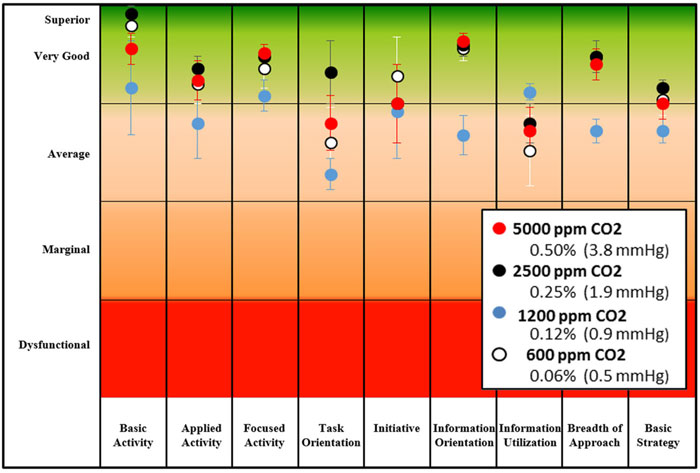| Tweet | Follow @co2science |
Paper Reviewed
Scully, R.R., Basner, M., Nasrini, J., Lam, C., Hermosillo, E., Gur, R.C., Moore, T., Alexander, D.J., Satish, U. and Ryder, V.E. 2019. Effects of acute exposures to carbon dioxide on decision making and cognition in astronaut-like subjects. Microgravity 5: 17; https://doi.org/10.1038/s41526-019-0071-6.
It is well-established that rising levels of atmospheric CO2 pose no direct threat to human health (see, for example, Liu et al., 2017 and Monsť et al., 2019). But what about human cognition and decision making? Might these important functions be impaired by rising atmospheric CO2?
Searching for an answer to this intriguing question was the scientific research team of Scully et al. (2019). Publishing their work in the scientific journal Microgravity, the ten U.S. researchers tested the mental acuity of 22 "astronaut-like" male and female subjects to four different CO2 concentrations (600, 1200, 2500 and 5000 ppm), subjecting them to standardized decision making and cognition tests (the Strategic Management Simulation and Cognition test batteries) routinely conducted on astronauts at the Johnson Space Center. The results are summarized below.
According to the authors, "there were no clear dose-response patterns for performance on either [the] Strategic Management Simulation or Cognition" evaluations. More specifically, they report that "performance on most Strategic Management Simulation measures and aggregate speed, accuracy and efficiency scores across Cognition tests were lower at 1200 ppm that at baseline (600 ppm); however, at higher CO2 concentrations performance was similar to or exceeded baseline for most measures" (see Figure 1). Consequently, when considering the full range of CO2 values examined, they conclude that "performance across tests did not differ between baseline (600 ppm) and the higher concentrations."
The above findings agree well with the recent work of Rodeheffer et al. (2018), who also demonstrated that rising atmospheric CO2 levels represent no direct threat to human cognitive performance and decision making. Such absence of findings add to the growing body of evidence that there will be no negative impacts of rising atmospheric CO2 on human health.

Figure 1. Mean ± 95% confidence intervals of percentile ranks for Strategic Management Simulation measures at targeted CO2 concentrations. Source: Scully et al. (2019).
References
Liu, W., Zhong, W. and Wargocki, P. 2017. Performance, acute health symptoms and physiological responses during exposure to high air temperature and carbon dioxide concentration. Building and Environment 114: 96-105.
Monsé, C/. Jettkant, B., Schramm, B.K.H., Broding, H.C., Knappe, M., Michl, M., Hoffmeyer, F., Sucher, K., Brüning, T. and Bünger, J. 2019. Effects of exposure to carbon dioxide in potash miners. Advances in Experimental Medicine and Biology - Neuroscience and Respiration 42: 1-10.
Rodeheffer, C.D., Chabal, S., Clarke, J.M. and Fothergill, D.M. 2018. Acute exposure to low-to-moderate carbon dioxide levels and submariner decision making. Aerospace Medicine and Human Performance 89: 520-525.
Posted 22 November 2019



